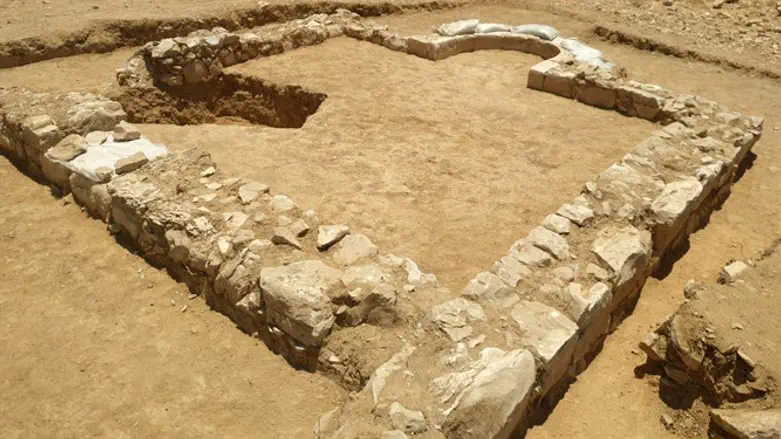
An ancient rural mosque, one of the earliest known in the world, has been discovered in the town of Rahat in the Negev.
The remains of this rare building were discovered by the Israel Antiquities Authority during the preparations for building a new neighborhood in the town of Rahat, in collaboration with Bedouin residents and youth groups, and financed by the Authority for Development and Settlement of the Bedouins in the Negev, and the Emek Ayalon Infrastructure & Projects Management Ltd (2000).
According to Dr. Jon Seligman and Shahar Zur, directors of the excavations for the Israel Antiquities Authority, "A small rural mosque, dated to the 7th to 8th centuries C.E., is a rare finding anywhere in the world, especially in the area north of Be'er Sheva, where no similar building has previously been discovered. From this period there are large known mosques in Jerusalem and in Mecca, but here we have evidence of an ancient house of prayer, which seems to have served the farmers who lived in the area. We found remains of an open-air mosque – a rectangular building with a "Mihrab" – a prayer niche – facing south, towards Mecca. These features are evidence for the purpose for which this building was used, many hundred years ago".
During the excavations, other remains were uncovered as well: a farm from the end of the Byzantine period (6th – 7th Century C.E.), and a small settlement from the beginning of the Islamic period (7th – 8th Century B.C.), which contains remains of buildings that were divided into living rooms, open courtyards, storage space and places which were used for preparing food and include "tabbuns" (open-air fire-places used for baking). According to the directors of the excavations, "these sites were part of the agricultural structure in the Northern Negev in ancient times. The soil was suitable for growing grains, and the ground water in the perennial streams attracted settlers who wanted to cultivate the land".
According to Prof. Gideon Avni, an Israel Antiquities Authority expert on this period, "this is one of the earliest mosques known from the beginning of the arrival of Islam in Israel, after the Arab conquest of 636 C.E.. The discovery of a mosque near an agricultural settlement between Be'er Sheva and Ashkelon also indicates the processes of cultural and religious change which the country underwent during the transition from the Byzantine to the early Islamic period. The discovery of the village and the mosque in its vicinity are a significant contribution to the study of the history of the country during this turbulent period. According to historical Islamic sources, the new Islamic regime distributed plots of land to its senior officials, including Amr ibn al-'As, an Arab military commander who conquered Israel and Syria. The continuation of excavations on the site will perhaps provide answers to the questions regarding the foundation of the settlement and the nearby mosque, and its connection to the Arab conquerors of Israel."
Bedouin residents of the area, as well as youth from the local villages and towns, participated in the excavation, including youth from Meitar, Gvaot Bar and Beit Kama. This was part of the Legacy Project led by the Antiquities Authority in recent years, which opens the doors for organized youth groups to help with the excavations during the summer vacation. Thus, they earn a fair wage, get into touch with the past, and gain experiences that will last a lifetime.
Currently, the Authority for Development and Settlement of the Bedouins in the Negev and the Israel Antiquities Authority are examining possible ways in which this special finding can be integrated into the new neighborhood which is about to be built in the city.